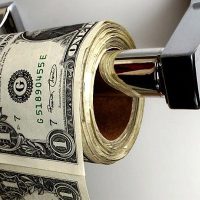-
The U.S. is where the rich are the richest
In the U.S., where wealth is most highly concentrated, almost a quarter of income goes to the rich. So it should come as no surprise that a big chunk of the world’s richest call America home. Two out of five millionaires and billionaires live there, and their ranks are growing fast.
-
The 2017 French Elections: A Grim Farce
The experience of the last three decades has clearly demonstrated that social struggles in and of themselves are not sufficient to stop the drift to the right and re-establish a dynamic of social advances. That requires going beyond defensive strategies and creating a positive alternative project that is authentically social and democratic.
-
This new museum imagines a world where capitalism is dead
Visitors will be invited to reflect on capitalism as if looking back at it from a world in which capitalism is dead. “Much of the evidence of capitalism is either eroding over time or simply not known or easily accessible to the public,” the mission statement reads. “Our ambition is to connect and integrate these many efforts before the evidence is erased forever.”
-
The continental revolution
Between the end of the Civil War and the early 20th century, the United States underwent one of the most profound economic transformations that any country has ever experienced. In 1865, the United States lagged far behind Britain in manufacturing output; by 1900, it would surpass the totals of Britain, France, and Germany combined.
-
New Perception of Imperialism
If accumulating wealth is the basic objective of capitalism, organising production using wage labour is only one of the ways it can be achieved. What finance does is to open an alternative route to reach the same objective, that is via transaction.
-
South Africa’s business community has not stepped up honestly
Prof Patrick Bond from the University of the Witswatersrand (Wits) tells Business Day TV why the World Economic Forum, which held its annual Africa meeting last week, serves the interests of the ruling elite at the expense of communities.
-
Slandering Populism
Populism properly understood is about popular and democratic opposition to the rule of the money power—to the reign of concentrated wealth. It emerged from radical farmers’ fight for social and economic justice and democracy against the plutocracy of the nation’s Robber Baron capitalists during the late 19th century. It was a movement of the left.
-
Kendeng Against Cement
Since March 13, 2017, over 50 local indigenous peasants known as Sedulur Kendeng, from Central Java, Indonesia, have been sitting with their feet in cement boxes in protest before the Presidential Palace. This is their second such protest in eleven months.
-
Migration as Revolt against Capital
The fact that a large number of refugees, especially from countries which have been subjected of late to the ravages of imperialist aggression and wars, are desperately trying to enter Europe is seen almost exclusively in humanitarian terms. While this perception no doubt has validity, there is another aspect of the issue which has escaped […]
-
Remarks on Capitalism and the Environment It Produces
“Remarks on Capitalism and the Environment It Produces” is a recently discovered draft paper of Harry Magdoff’s. The exact date and location of its presentation is unknown; however the occasion was quite clearly a panel on economist Michael Tanzer’s The Sick Society (1971). We can therefore assume that it was written in 1971 or 1972. It is provided here in its original form with only minor copyediting. The title has been added. In our view, the chief importance of the paper is Magdoff’s early development of ecological ideas, ideas that are now much more common on the left.
-
Mészáros and the Emancipatory Transition: Beyond Capital in the Twenty-First Century
Part One In his work Capital in the Twenty-First Century (Belknap Press, 2014), Thomas Piketty contributes much to understanding the inequalities of income, inheritance, capital, and wealth generated by the capital system. We are not likely to disagree with many of his insights based on his study of capital and wealth distribution. Among these […]
-
It’s Capitalism, Stupid!
Global capitalism is the 800-pound gorilla. The twin ecological and economic crises, militarism, the rise of the surveillance state, and a dysfunctional political system can all be traced to its normal operations. We need a transformative politics from below that can challenge the fundamentals of capitalism instead of today’s politics that is content to treat […]
-
Interview with KKE’s Kostas Papadakis on Why KKE Does Not Support SYRIZA: “We Are Against the EU, NATO, and Chains of Capitalism”
Greek Communist Party (KKE) MEP Kostas Papadakis firmly says: “SYRIZA has made very clear that it is not going to defy the EU or NATO. We say: What kind of left is this?” “The EU has no fear of SYRIZA. SYRIZA is not the oligarchy’s first choice, but it is the new face of social […]
-
An Interview with Dawn Paley, Author of Drug War Capitalism
Dawn Paley is a Canadian author. Drug War Capitalism (AK Press, November 2014) is her first book. We conducted an e-interview as protests grew against police and military policies in Mexico and the U.S. The drug war on both sides of the border has played no small role in generating such dissent. Seth Sandronsky: Can […]
-
Fracking Patria, Fracking Humanity: Capitalism and Its Doubles
Many Venezuelans think that fracking — the dangerous extraction of oil and gas through hydraulic fracturing of sedimentary rocks — is a conspiracy on the part of the United States to drive them into ruin. That is not the case, but it is an understandable error, in part because of the US’s long history of […]
-
Man Acquitted, 30 Years Later, for “Subversive Books” on Capitalism and Revolution
This article was first published by the Hankyoreh on 25 November 2014; it is reproduced here for non-profit educational purposes.
-
Capitalism, Inequality and Globalization: Thomas Piketty’s Capital in the Twenty-first Century
I. The Piketty Argument Thomas Piketty’s book Capital in the Twenty-first Century embodies an immense amount of empirical research into the distribution of wealth and income across the population for a number of advanced capitalist countries going back for over two centuries. In particular Piketty has made extensive use of tax data for the first […]
-
The Problem Is Capitalism
NYC Climate Convergence, September 20, 2014 A. The Environmental Crisis The “environmental crisis” is actually a number of crises, including the following: climate change; acidification of the oceans (related to elevated atmospheric CO2 levels); pollution of air, water, soil, and organisms with harmful substances; degradation of agricultural soils; destruction of wetlands and tropical forests; and […]
-
Unraveling Capitalist Globalization
Despite the prolonged global economic crisis since 2007/2008, neo-liberal economic thought and practice continue to reign supreme. In his important book Capitalist Globalization: Consequences, Resistance, and Alternatives (Monthly Review Press, 2013), Martin Hart-Landsberg makes a number of key interventions unraveling the myth of neo-liberalism as well as the dynamics underlying capitalist accumulation. First, he identifies […]
-
Debate on Capitalism, Environmentalism, and “Environmental Catastrophism”
The Environment and Capitalism: Response to Ian Angusby Sam Gindin The most critical question confronting anyone concerned with the environmental crisis is the political one: how to build a social force able to do something about it. The most important division among social activists is not between those who think an environmental collapse is imminent […]








